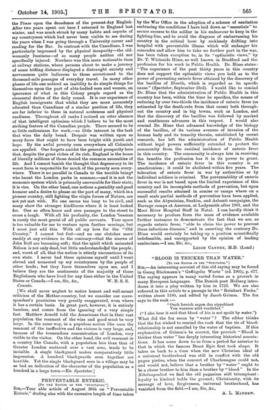[To THE EDITOR OF THE "SPECTATOR."]
Sin,—An interesting account of this old saying may be found in Georg Bfichmann's " Gefliigelte Worte " (ed. 1905), p. 677. The saying appears in many varied forms as a proverb in many European languages. The Danish poet Holberg intro- duces it into a play written by him in 1723. We are also referred in this article to a passage in the "Reinhart Fuchs," written about 1180, and edited by Jacob Grimm. The fox says to the rook :— "Ouch hcerich sagen daz sippebluot Von wazzere niht verdirbet."
("I also hear it said that blood of kin is not spoilt by water.") What did the fox mean by " water " ? The editor thinks that the fox wished to remind the rook that the tie of blood- relationship is not annulled by the water of baptism. . If this explanation of Grimm's be correct, the proverb "Blood is thicker than water" has deeply interesting historical associa- tions. It has come down to us from a period far anterior to that in which the famous Beast Epic first took shape. It takes us back to a time when the new Christian ideal of a universal brotherhood was still in conflict with the old pagan pieties, when the convert of Charlemagne could not, and would not, believe that a brother by " water " ought to be a closer brother to him than a brother by "blood." In the Nibelungenlied we find the old paganism still triumphant : loyalty to kindred holds the ground; Christianity, with its message of love, forgiveness, universal brotherhood, has vanished from the field.—I am, Sir, &c., A. L. MAYHEW.














































 Previous page
Previous page